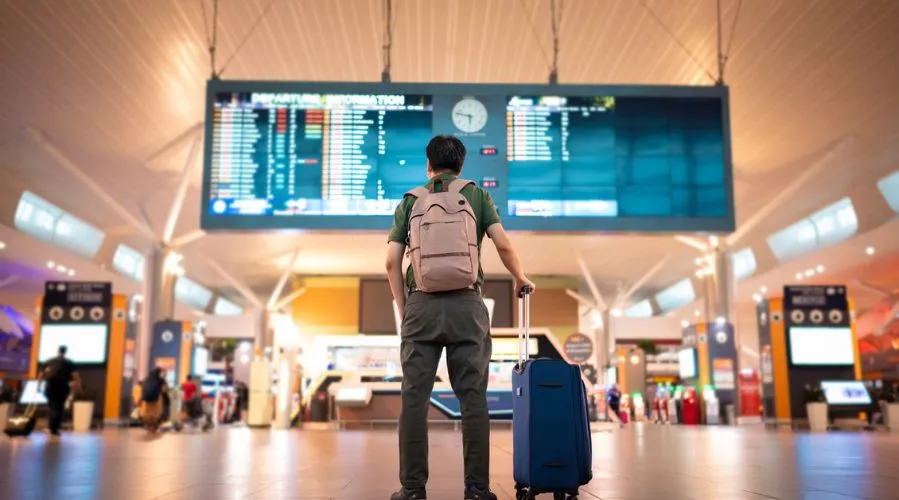Will I need a visa to travel to Italy from the U.K.?
If you are a U.K. citizen, you will not need a visa to travel to Italy if you plan on staying for fewer than 90 days, even though Britain left the European Union in 2020, with transitional arrangements expiring at the end of the year. This is because there is a visa-free travel arrangement between the EU and the U.K. for short-stay visits. From the end of 2023, those looking to travel to Italy without the need for a visa will need to apply via the ETIAS system facilitating visa-free travel to all Schengen Area states. Before then you will just need your passport.
How will I apply for ETIAS?
You will need to fill out an ETIAS application form online, which is expected to take about 10 minutes to complete, with you answering various questions and providing personal details. The only document you will need is your valid biometric passport, preferably with an electronic chip. Once approved, this will be valid for trips for three years or until the end of the validity of the passport registered during the application, whichever comes first.
However, if you are living in the U.K. but are a citizen of a country without a visa-free travel arrangement with Italy and the rest of the Schengen Zone countries, you will need to apply for a Schengen Visa for short stays in Italy.
Longer stay visas
For longer stays to work, live or study in Italy, British citizens will need to apply for visas and residency permits, as Brexit has ended freedom of movement between the U.K. and EU countries.
If I need an Italian visa, how and where do I apply from the U.K?
The firm VFS Global Italy UK handles visa applications on behalf of Italy in the U.K. You can fill in your application form on the VFS website.
You will need to book an appointment at a VFS Italy UK center. Where you book your appointment will depend on where you are based. If you are in Scotland, you should book an appointment at the center in Edinburgh. There are two centers that serve England and Wales - those in London and the south should book an appointment in London and those in the north should book their appointment at VFS’ Manchester center.
You can also apply for an Italian visa at the Consulate General of Italy in Edinburgh or London. More information and contact details are available via the website, here: the Italian embassy in London website
Their respective email addresses are: visa.edimburgo@esteri.it and visti.londra@esteri.it.
You can find the VFSGlobal website, here: VFSGlobal.
What documents will I need for my appointment?
To obtain a short-stay visa, you will need a valid passport or travel document issued within the last 10 years that is valid for at least three months after the date you exit the Schengen Area. You will also require a valid U.K. residency permit or another form of identity card, one passport-style photo, travel and medical insurance which is valid in the whole Schengen Area and covers you up to costs of €30,000, a cover letter stating the purpose of the visit and your itinerary, including travel tickets and proof of accommodation, such as rental agreements, hotel bookings, or an invitation from friends and family, as well as proof of civil status, like a marriage or birth certificate, and proof of financial subsistence during your stay (the amount you need in Italy varies from €45 to €28 per day, depending on the length of your trip), such as bank statements.
Additionally, for long-stay work, study, or family residency visas (to join a spouse in Italy) you also need an invitation letter from the firm or institution inviting you to Italy for work or educational reasons. For work visas, you should provide evidence of a salaried employment contract. Those who are highly skilled or who earn high salaries (approximately €55,200) can apply for an EU Blue Card, entitling you to work across the European Union. Otherwise, you should check that your qualifications and skills match the strict requirements for an entry set by the Italian government.
If you are joining a family member you will need to prove they are a citizen or legal long-term resident of Italy, with documents like a passport or residency permit, social security card, proof of your relationship - as well as proof you or your family can sustain yourselves financially. You will also need to apply for a temporary residency permit allowing you to stay in Italy - which must be done at the post office within eight days of your arrival, and then completed and handed in at the local police station.
Short-stay visas cost €80 and €40 for children aged 6 to 12 years old, with those below that age exempt from the fee, as are spouses and family members of Italian nationals. Long-stay visas cost €105.20 for work visas, €45.40 for study visas, and family reunion ones, €36.30, with the residency permit costing €76.00. You will also need medical insurance as it is a mandatory requirement of a long-stay visa.
Frequently asked questions about applying for a visa to Italy from the U.K.
If I’m a resident of the U.K. but not a citizen, do I have visa-free travel to Italy?
It depends on the country where you hold citizenship - the U.S., Brazil, and Mexico all have visa-free arrangements, but India and China do not, meaning you will need to apply for a visa.
What is the cost of travel and medical insurance needed for entry into Italy on a Schengen Visa?
AXA offers insurance that will meet your visa requirements from as little as €22 per week of your trip - as well as more extensive cover.
If my visa is refused, can I appeal, and can I get a refund on my travel insurance?
Yes, you can appeal - although the reversal of a decision is rare. AXA provides a full refund on travel insurance should your visa application be denied.
AXA already looks after millions of people around the world
With our travel insurance we can take great care of you too
AXA Schengen's Travel Insurances

AXA Schengen Basic
AXA Schengen Basic is perfect to obtain your Schengen visa. This travel insurance meets all the requirements demanded, covers you in all the countries of the Schengen Area as well as 4 European microstates (Andorra, Vatican City, Monaco and San Marino).

AXA Schengen Essential
AXA Essential is perfect to obtain your Schengen visa. It provides coverage in the 27 Schengen countries + the European microstates + all the EU countries (including UK, Cyprus, Bulgaria, the Republic of Ireland and Romania). And you get additional guarantees compared to AXA Schengen Basic.

AXA Schengen Annual
AXA Annual is perfect to obtain your Schengen visa. This annual travel insurance is ideal for those who often travel to Europe as well as multiple-entry Schengen visa holders. You get the same guarantees as AXA Schengen Annual for different countries during 90 days.


